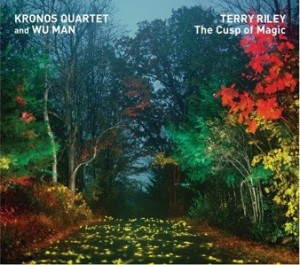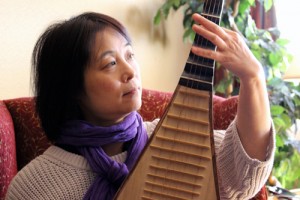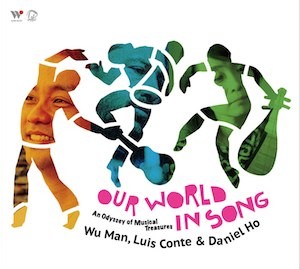Podcast: Play in new window | Download
Subscribe: RSS
 Hear this interview in the Echoes Podcast here or download it from iTunes.
Hear this interview in the Echoes Podcast here or download it from iTunes.
The pipa is a Chinese lute, shaped like a teardrop with a course of deeply fretted strings that are played with fingernails. Wu Man is the Yo-Yo Ma of this instrument. And she’s played with the renowned cellist among many American and Asian composers and musicians, bringing the ancient Chinese instrument into the 21st century. At this year’s Big Ears Festival, Wu Man played with the Kronos Quartet, performing Terry Riley’s Cusp of Magic and a solo set. In her Knoxville hotel, Wu Man took me on a pipa journey.
When Wu Man came to America some 25 years ago, there weren’t a lot of places where she could play the pipa, the ancient Chinese lute of which she is a master.
“I think I was very brave,” Wu Man laughs, “Cause when I left China, all my friends asked like what are you doing there? You know, you play this Chinese instrument, you’re not a pianist. And what are you gonna do? That was very challenging, but I’m really fortunate when I look back 25 years and now I’m still playing this instrument”.
 A diminutive, delicately beautiful woman with stylishly bobbed black hair, Wu Man becomes part of her instrument when she sits it on her lap, bending her body around its teardrop shape.
A diminutive, delicately beautiful woman with stylishly bobbed black hair, Wu Man becomes part of her instrument when she sits it on her lap, bending her body around its teardrop shape.
“It is part of my body,” she expresses, “I think that’s the only way you can, not only can control the instrument, but you can express. That’s like your extension, your body extension”.
Wu Man has done more than just play pipa. She’s created a western home for it in contemporary music, performing compositions by minimalist composers and collaborating with folk musicians and world music ensembles. Some of her most renowned work has been with the Kronos Quartet.
“For me, not only is Wu Man one of the great instrumentalists of our time, she also is a very generous musician,” proclaims violinist David Harrington of the Kronos Quartet. “She’s not restricted by a viewpoint from this conservatory, this tradition. She’s kind of interested in the expanse of Chinese culture. So I’ve come to think of her as my best window into the culture of a billion people”.
Wu Man has been part of several Kronos Quartet projects including, Soul written by Chinese composer Zhou Long and Ghost Opera, written by another Chinese composer, Tan Dun.
And then, “About ten years later, Terry Riley was at the San Francisco performance of Ghost Opera,” says Harrington.
That resulted in Terry Riley composing The Cusp of Magic for Wu Man and Kronos. Riley’s compositions have subtexts of Indian music and jazz, and he brought the pipa to a different place.
“A lot of Indian music inference,” explains Wu Man, “Like a sitar and a lot of passages are like jazz guitar, which never happened on pipa before”.
Wu Man didn’t come to this musical freedom easily. She was a child during the Chinese Cultural Revolution, when traditional culture was prohibited in favor of revolutionary propaganda songs. That lasted until 1976 when Wu Man was 13.
 “When I started to play pipa in the late ‘70s,” she reflects, “ a lot of traditional pieces weren’t allowed to be played publicly. Mostly we played revolution songs publicly, but we could learn privately. So that’s actually how we learned the traditional music”.
“When I started to play pipa in the late ‘70s,” she reflects, “ a lot of traditional pieces weren’t allowed to be played publicly. Mostly we played revolution songs publicly, but we could learn privately. So that’s actually how we learned the traditional music”.
Western music was considered blasphemy against the revolution, except underground. But she made up for lost time when she moved to America in 1990. She had an easy affinity for western music. She says when she heard the blues on the radio, she thought it was Chinese.
“Yes, I heard it on the radio and I wondered, ‘that’s Chinese music! Wow! It’s playing on the radio’”, she hoots, “And I listened closer and realized ‘Oh, that’s blues’”.
With a pipa on her lap, she goes to the Mississippi Chinese delta, bending notes like a blues guitarist.
“The technique of the pipa, the left-handed vibrato, bending notes, that’s what really kind of makes blues,” she explains..
Work with Kronos Quartet, Philip Glass and Lou Harrison came in quick succession when she arrived in America. She’s also an original member of Yo-Yo Ma’s Silk Road Ensemble, a global music fusion that celebrates 15 years together.
Last year Wu Man released the album, Our World in Song with Hawaiian slack key guitarist Daniel Ho and percussionist Luis Conte. It’s a deceptively deep dive on children’s classic songs from around the world. Among the surprising arrangements on the album is a meditative take on “Frere Jacques.” Wu man says the French song has a doppelgänger in China.
 “So Frere Jacques in Chinese is Liang Zhi Lao Hu,” she explains, “It means two tigers, but it’s the same song, but just different lyrics. I grew up with that song. If you sing that in China, everyone will know”.
“So Frere Jacques in Chinese is Liang Zhi Lao Hu,” she explains, “It means two tigers, but it’s the same song, but just different lyrics. I grew up with that song. If you sing that in China, everyone will know”.
There isn’t much left for Wu Man to do except plug in, and she’s done that too.
“I did!” she exclaims, “I actually did! I have an electronic pipa with me in my home. I have that because I had a project through the Kronos Quartet, it’s called A Chinese Home. So in one section, which is all electronic music, my pipa is plugged in”.
They haven’t recorded A Chinese Home yet, but there is a short clip of Wu Man goofing on Black Sabbath’s “Iron Man” during a sound check. Tony Iommi has nothing to worry about but it shows how far Wu Man has come from playing revolutionary songs. She has traveled as far musically as she has geographically and it has changed her approach to the pipa.
“I wouldn’t say changed, but definitely I have my own musical language,” she ponders, “my own style because I learned from other cultures. Even when I play traditional pieces, you can hear the difference. I feel like I’m much richer”.
Wu Man’s latest albums include, Elegant Pipa Classics and Our World in Song and she’s also currently performing Pipa Concerto No. 2 written for her by Zhou Jiping.
~John Diliberto
